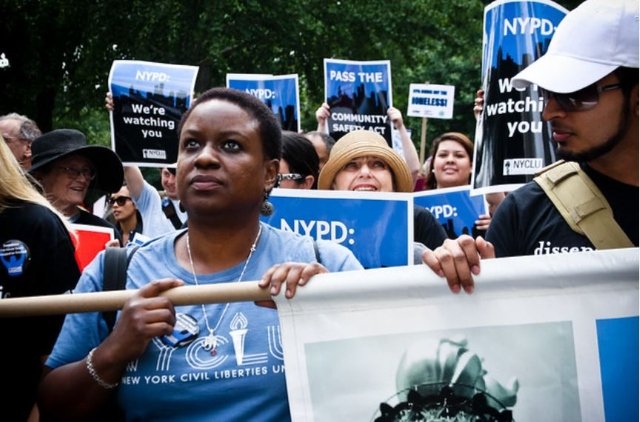No Racial Profiling By The NYPD? Advocates Say That's Unbelievable
June 27, 2019, 2:15 p.m.
'The NYPD continues to this day, to say, look this is not about racial bias, there's no systemic problem here.'

A protest against stop and frisk in NYC in 2012.
Six years ago, a federal judge ruled that the department’s use of stop, question, and frisk was discriminatory and unconstitutional, and later ordered the NYPD to investigate claims of biased policing and racial profiling. So when the NYPD’s Inspector General released a report on Wednesday noting that the department had investigated and closed nearly 2,000 complaints of biased policing without substantiating a single case, police reform advocates found the NYPD’s figures unbelievable.
“Despite a federal court finding, despite years and years of statistics that have shown severe and frankly unjustifiable racial disparities in who they are policing and how they are policing them, the NYPD continues to this day, to say, ‘Look this is not about racial bias, there's no systemic problem here,’” said Darius Charney, a senior attorney at the Center for Constitutional Rights who represented some of the plaintiffs in the stop and frisk trial.
Charney called the zero substantiation rate troubling, and said he believes nothing will change until the NYPD admits that biased policing is a problem in its ranks.
Chris Dunn, Legal Director at the NYCLU, said the fact that no complaints were substantiated raised serious concerns about what the NYPD’s threshold for biased policing is.
“The results undermine the idea that there is a mechanism to hold police accountable for discriminatory practices and further erodes the trust between the public and the police,” Dunn said in a written statement.
Jeff Schlanger, NYPD Deputy Commissioner of Risk Management, said that the issue was bigger than his department: “This is a nationwide problem which emanates from the difficulty in proving the intent behind any particular action, and in fact the Inspector General validates the difficulty.”
Schlanger said there is a 33 percent drop in biased policing complaints over the past year. He argued that this was because of work the NYPD has done with the federal monitor to change policies and improve training, not because the public was losing faith in the process.
The IG report also noted that the NYPD runs background checks on citizens who file a biased policing complaint against an officer, which Charney also found alarming.
“To you know essentially delegitimize or give their views, their complaint, less weight because they may or may not have a criminal history is really troubling,” he said.
Schlanger countered that the background checks are done whenever the NYPD conducts an investigation, and called them immaterial when it comes to determining whether to substantiate a case. He also said investigators do them because they need to know who they are dealing with before visiting a complainant.
But the department was criticized in the report by the IG for often not interviewing the person who makes the complaint.
Among several recommendations from the IG was that the Civilian Complaint Review Board take on more of these investigations.
"There's no reason why racial profiling complaints should be treated differently than any other abuse of authority misconduct complaint," Charney said. "All of those other abuse of authority complaints go to an outside agency, in this case the CCRB, there's no reason these racial profiling cases should be kept in-house in the NYPD.”
Right now, the only forms of biased policing the CCRB investigates are racial slurs, because they consider it a form of offensive language. The CCRB says that more investigations means they're going to need more resources, including more staff with statistical expertise and more access to records.
The Chair of the CCRB, Fred Davey, explained that to prove patterns—important when proving discriminatory intent—his investigators would need full departmental personnel records and statistics on enforcement activity.
“Without this the CCRB would be forced to unsubstantiate all but the most obvious allegations of profiling,” he wrote in a statement.
The CCRB said it's currently in talks with the NYPD about getting more access to their records.
Cindy Rodriguez is an investigative reporter for New York Public Radio. You can follow her on Twitter at @cynrod.